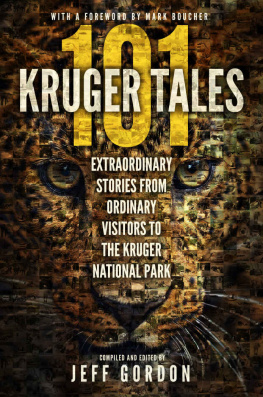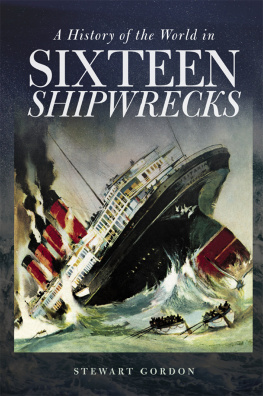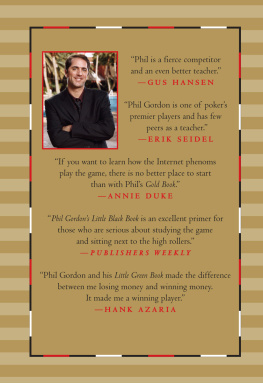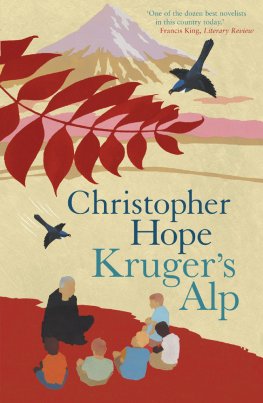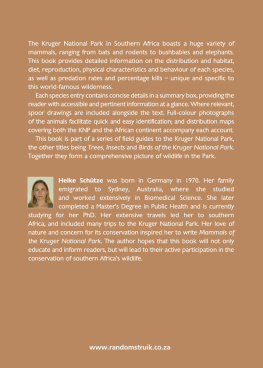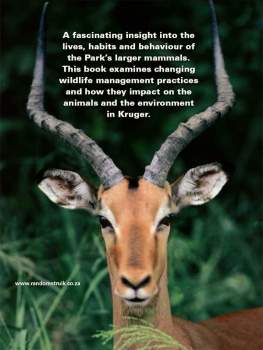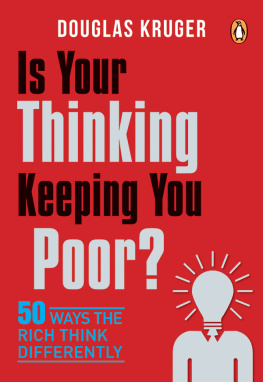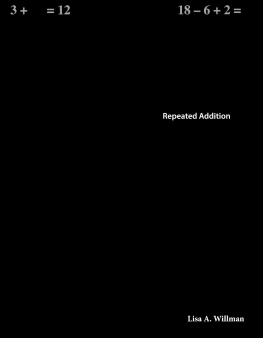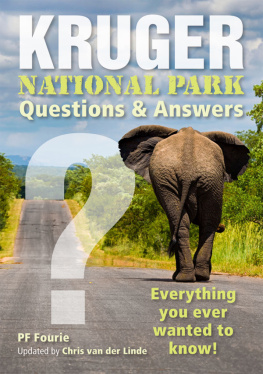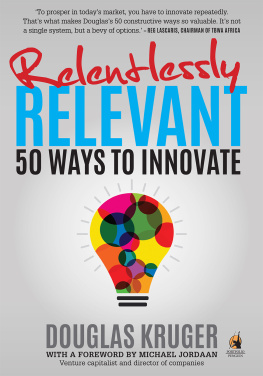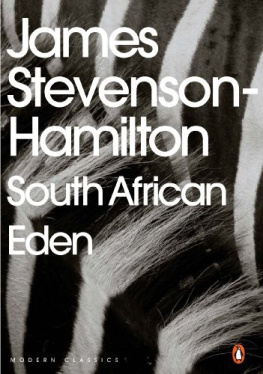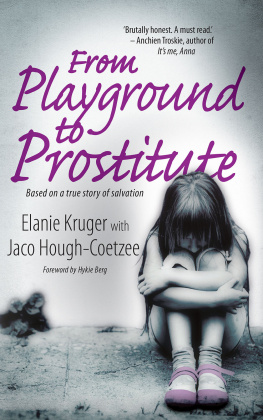I would like to acknowledge all the Kruger National Park visitors who granted me permission to publish their true stories.
()
First published in 2014 by Leadwood Publishing
This electronic edition v2.1 published in 2015 by Leadwood Publishing
Copyright in published edition, 2014: Jeff Gordon
Copyright in introduction & other peripheral text, 2014: Jeff Gordon
Copyright in stories, 2014: as credited in the section at the end of the book.
Copyright in photographs, 2014: as credited in the section at the end of the book.
The permissions and picture credits at the back of the book constitute an extension of this copyright page.
The right of Jeff Gordon to be identified as the author of this Work has been asserted in accordance with the Copyright Act 98 of 1978
All rights reserved. No part of this publication may be reproduced, stored or introduced into a retrieval system, or transmitted, in any form, or by any means (electronic, mechanical, photocopying, recording or otherwise) without the prior written permission of the publisher. Any person who does any unauthorized act in relation to this publication may be liable to criminal prosecution and civil claims for damages.
Cover design by Kit Foster
Map design by Vlad Popon
ISBN 978-0-620-61133-6 EPUB
Every effort has been taken ensure that the vital contents of all the submitted stories included in this book are accurate, fair and truthful. I apologise for any errors, omissions, infringements or unintended statements possibly of a harmful nature within any of the stories or other parts of this book, including photographs. In the event of the above please notify corrections@krugertales.co.za and these will be rectified in future editions and listed at www.krugertales.co.za/corrections
Got an extraordinary Kruger story of your own? Submit it for the next volume.
www.krugertales.co.za
CONTENTS
To that dying breed of Kruger visitor: the one who still drives slowly, still raises a finger of greeting to every oncoming car and still stops to share, with barely concealed delight, what you may find in the shade of an umbrella thorn just a few kilometres down the road
FOREWORD
We in South Africa are blessed to have the Kruger National Park. It is, and always will be, one of my favourite destinations. Anyone who has been lucky enough to have visited this special place will have a story or two to tell. Well, I am no different.
About a year before my final tour to England, I met a man, Frik Rossouw, who changed my life not that he ever intended to. He heads up the anti-poaching intelligence operation in Kruger and was instrumental in steering me towards the cause of rhino conservation following my retirement from cricket. Albie Morkel, a fellow cricketer, was good friends with his son, Jean, who lives in Skukuza, and together they organised a tiger fishing trip to the lower Sabie River.
The expedition, which would take us far from the publicly accessible parts of the Park, included Albie and his brother (the formidable fast bowler, Morne), my team mate Jacques Rudolph, as well as Jean and two other brothers, Ludwig and Jaco Sevenster.
It was going to be a three or four-day trip, with fishing in the mornings and game drives in the evenings. We slept in tents and made camp every night it was bliss. On the final day we pushed deeper into the Park, found a large waterhole and made camp around it for the night.
Albie Morkel was to be the chef for the evening. When he opened one of the cooler boxes, however, he immediately smelled something rotten and discovered that the chicken we were going to braai that night had completely gone off. He did his level best to clean out the cooler, but in doing so, he unwisely discarded the rotten chicken into the bush nearby.
It wasnt as dangerous for the Morkels or the other guys because they were all sleeping in army tents made of thick canvas. I, on the other hand, was in a small pop-up tent which Id bought in Cape Town and was more suited to a kiddies' birthday party. I pitched it in between the proper tents and hoped for the best. Poor old Jacques Rudolph had to share it with me.
It had been a superb day. We had seen seven or eight rhino, and we could hear the elephants drinking at the waterhole and the lions roaring in the distance. But the smell of that discarded chicken in the bush seemed to be making the hyaenas go crazy. We had a couple of mugs of red wine to celebrate the day and help us get to sleep.
At about one oclock in the morning, long after wed got to sleep, the fire was going down and the hyaenas were, we thought, at a safe distance. I was abruptly woken by quite a commotion and, moments later, heard a voice yelling: F off, f off, VOETSAK! Jacques and I were suddenly very aware that our tent was about as thick as GladWrap.
We looked nervously out of the entrance and there was Albie, standing up and shining a torch about frantically. When I asked what the problem was, he said something had just tried to bite his head through the tent. I thought he was joking, but he insisted that something really had just tried to bite his head. Taking the torch, we went round the back of the tent, and there in the darkness stood a clan of about 15 hyaenas, just staring at us. We clapped and shouted voetsak, before they reluctantly turned and ran away.
With the hyaenas gone, we inspected the tent to see what had happened. Albie had been lying with his head right up against the back of the tent, but fortunately the canvas was pulled just tight enough to prevent the hyaena getting a proper grip on his skull. We still werent sure whether to believe him until we saw all the fang marks and the slobber and saliva on the canvas. The sports headlines the following day would certainly have made for interesting reading if that tent had been made of a thinner fabric. Needless to say we didnt get much sleep for the rest of the night. We woke Frik who had the rifle and lit the fire again, then stayed up chatting until dawn. It was an incredible experience.
On that trip we were privileged to explore parts of the Park inaccessible to regular tourists. But countless Kruger visitors have had remarkable experiences on the Parks roads, in the rest camps and even on foot and they are well documented in this book. Some are funny, many are hair-raising and others genuinely scary. I particularly enjoyed the story of the leopard stealing the bacon off a skottel at Afsaal picnic spot Ive eaten breakfast there on quite a few occasions
Thats what nature enraptures us with: the right to be extremely unpredictable in its own environment. And that is perhaps what keeps us all returning to Kruger time after time you never quite know what you might encounter around the next bend.
People will know I have been heavily involved in the war against rhino poaching. I have been witness to a few crime scenes in Kruger, and it is not a pretty sight. It is the sad truth of how human greed can get the better of us. I do, however, have hope for our rhinos, among other struggling species. There are plenty of unsung heroes out there doing awesome work for conservation. It is because of these people that I believe I will one day have the pleasure and privilege of bringing my children to this special place, to continue to add to the amazing encounters in this book.
MARK BOUCHER
Mark Boucher is a former South African cricketer. Widely regarded as one of the greatest wicketkeepers of all time, he still holds the record for the most dismissals by a wicketkeeper in Test cricket. Forced to retire in 2012 following an horrific eye injury, he has thrown himself into conservation, particularly the fight against rhino poaching, and spearheads SAB Boucher Conservation a non-profit fundraising organisation aimed at saving South Africas threatened rhino population.

